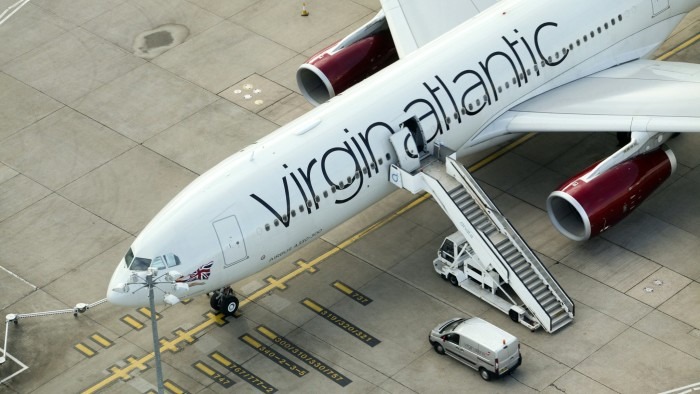
Airlines accused of misleading claims amid historic transatlantic biofuel flight.
Virgin Atlantic and British Airways face complaints for sustainable flight assertions, accused of misleading customers about aviation’s environmental impact.
This week witnessed Virgin Atlantic initiating the inaugural transatlantic flight propelled entirely by “sustainable” jet fuel, primarily sourced from cooking oil. Partially funded by the UK government, this flight received significant attention from airlines and government officials, touting it as a potential guilt-free flying method. However, scientists and environmental organizations harbor skepticism.
Possible, a climate charity, alongside the law firm Leigh Day, lodged formal complaints against the airlines regarding their emission reduction claims.
Alethea Warrington, senior campaigner at Possible, remarked, “The truth is that cleaner flight technologies either don’t function or don’t yet exist. Airlines’ misleading emission claims unjustly affect travelers aiming to make eco-conscious choices. It’s time for airlines to candidly address their substantial emissions.”
The OECD’s National Contact Point mechanism received complaints alleging that both airlines mislead consumers regarding their claims of reducing carbon emissions from flights, emphasizing that ordinary individuals lack the expertise to discern the limits of decarbonization technology.
Airlines advocate the use of biofuels derived from crops or green hydrogen generated from renewable energy. However, recent research from the Royal Society revealed that achieving the UK’s ambitions for net-zero flying would necessitate dedicating over half its farmland or more than doubling its total renewable electricity supply to produce sufficient aviation fuel.
The filing highlights British Airways’ assertion of driving urgent action towards net-zero emissions and its proclaimed “clear roadmap” to achieve net-zero carbon emissions by 2050. Yet, analysis discovered that BA’s jet fuel emissions increased yearly from 2016 to 2019.
Virgin Atlantic showcases its “mission to net zero” in promotional materials but omits its failure to meet emissions targets, an omission deemed crucial information by Possible for consumers.
The charity also cites scientific literature comparing lifecycle emissions from biofuels with conventional jet fuel, indicating that these fuels might potentially produce higher emissions than kerosene. Both feedstocks yield fuels with similar tailpipe emissions to kerosene, with claimed emissions reductions occurring at a systemic level.
The charity emphasized, “For biomass-derived fuels, the land required to produce biofuel crops is insufficient to power aviation without causing damaging deforestation, escalating emissions and rendering biofuels as detrimental to the climate as, if not worse than, kerosene.”
In response, a British Airways spokesperson stated, “In 2019, we committed to net-zero emissions by 2050, and as part of our BA Better World program, we have a clear roadmap of initiatives in our pursuit of this goal.”
In the immediate future, our focus involves enhancing operational efficiency, investing in advanced, more fuel-efficient aircraft, and gradually integrating sustainable aviation fuels (SAF) through partnerships in both the UK and US. Looking ahead in the medium to longer term, our emphasis remains on investing in SAF development—a crucial pathway to achieving decarbonization. Simultaneously, we’re exploring ways to contribute to the advancement of zero-emissions hydrogen-powered aircraft and carbon-removal technology.

“We took the pioneering step of reporting our carbon footprint over two decades ago and voluntarily joined the UK emissions trading scheme ahead of others,” stated a Virgin Atlantic spokesperson.
“At Virgin Atlantic, our commitment revolves around achieving net-zero emissions by 2050, with interim targets set on our journey to reach this goal, including a 10% integration of sustainable aviation fuel by 2030. Our focus for in-sector carbon reductions in the near to medium term primarily revolves around the fleet we operate and the fuel we utilize. Besides maintaining one of the youngest and most efficient fleets for transatlantic flights, we’ve been at the forefront of pioneering sustainable aviation fuels for over 15 years, recognizing the immediate potential to reduce lifecycle carbon emissions by up to 70%.”



